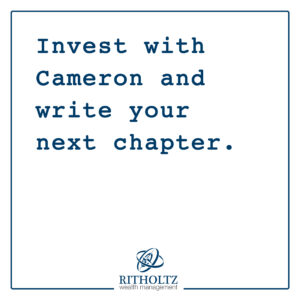Guys, it finally happened.
After six years of only dealing with seasonal allergies, dodging Covid, and the occasional sore throat, I caught the flu!
I’m a pretty healthy guy, too. So it didn’t make sense. I got the flu shot in January. I exercise 4-5 times a week, drink a glass of orange juice daily, still abide by the 5-second rule, and (only) occasionally drink excessively. Healthy as an ox!
Yet, I woke up last Monday and couldn’t stand on my feet. I usually work out every Sunday, but this wasn’t it. My back was stiff, and I couldn’t see straight. The heat was set to 75 degrees, I was wearing a hat, yet I was still shivering. It took me about a week to really feel like I was back to 100%.
Suffice it to say that we never truly appreciate our health until it’s in jeopardy. Trust me, it’s all fun and games until you’re trying to sleep and you can’t breathe out of both nostrils.
When it comes to our finances, a question I often hear from people is, “how can I maximize all my options?” And the surprising response is that you should start at home with the low-hanging fruit (no pun intended).
After retirement savings are set, and everyday costs are optimized as best they can be, many young professionals don’t realize they could seriously benefit from a Health Savings Account (HSA).
It’s tax efficient. An additional source of saving for now and later. And after the Cares Act expanded the list of qualified expenses, it can come in handy for preventative measures like masks, hand sanitizers, and even cold and flu medicine, especially during this God-awful allergy season.
Check out all these reasons why an HSA could be your next secret weapon.
For HENRYs
The biggest challenge for HENRYs (high earners, not yet rich) and someone who is finally starting to see their wages increase is understanding what I call afforded comfort; or what others call Lifestyle Creep.
In today’s world, where even the little things are much more expensive, it’s not hard to see your monthly burn rate tick higher and higher. But, as CNBC’s Jasmin Suknanan better articulates:
“It may sometimes be tempting to simultaneously upgrade your car, move to a fancier apartment, splurge more on nights out, do more shopping and so on. This is called lifestyle creep, and it occurs when you earn more money so you inflate the amount you spend on discretionary items.
The key to knowing the difference between lifestyle creep and simply enjoying a higher level of income lies with your goals.”
Finding the balance between living for today and saving for tomorrow is still one of my most fierce debates. Still, we all know some sacrifices need to be made.
Many of these same people are balancing record-high home costs, wildly expensive childcare, and inflation raising the prices of everything. Still, it’s impressive to see that they are already making advanced moves like maxing out the 401k and/or doing backdoor Roth conversions.
However, Sam Dogen, founder of Financial Samurai, says, “the number one complaint by [HENRYs] is high taxes.”
The great thing about HSAs is that they are triple tax-advantaged!
You can:
- Reduce your taxable income (like 401(k) contributions)
- If you’re single, you can contribute up to $3,850 annually, and families up to $7,750 (2023).
- Tax-free growth on the way up
- Tax-free distributions on qualified healthcare costs.
The other important thing to mention is that HSAs are allowed to be carried over year after year, and it’s not tied to one employer like standard health insurance or FSAs. So, if we’re still in the Great Resignation era, having something you can take with you no matter where you get your paycheck is a win-win.
Of course, there’s always a catch. The penalty for non-qualified distributions is doubled to 20% — not just the typical 10% you see for IRAs and 529s. And you’ll need to enroll in a high-deductible plan to be eligible to contribute to an HSA.
This really means having a solid emergency savings for higher out-of-pocket costs is crucial.
The Execution
Younger people often don’t have a lot of health expenses, which can make it feel like an HSA is unnecessary.
But, one popular strategy I’ve seen people use with their HSA is reimbursing themselves at the end of the year or even years later.
So long as the expenses came after you opened the HSA and you keep your receipts, fortunately, the IRS doesn’t care when the year the expense was incurred and the year you decided to reimburse yourself.
Otherwise, why touch it?
In addition to being extremely tax efficient, after age 65, HSAs can be used for any expenses with no penalty tax.
Not a huge selling point, but if you’re worried about the money being useless, it’s not.
I’ve seen a good allocation span anywhere from 50/50 — 72/25, equity to cash, depending on whether you plan to use the funds within that year. Of course, you could argue why let free yield go to waste when bond yields are finally not just a drag on your portfolio. But I think it’s valuable to always keep cash on hand just in case any unexpected withdrawal need arises.
It Starts at Home
Today, I’m being overly self-conscience about my immune system and my overall health, for that matter.
It took me too long to realize that gluten is not my friend. It’s felt like my life has improved tenfold since cutting out so much gluten in my diet. Who knew eating better could make such a difference?
I guess as a kid I never really noticed because, at my elementary school, we treated kickball like the NBA playoffs.
I’ve said this for a long time, but I wish schools spent more time on the things we have to deal with daily. Like personal finances, how our government works, and nutrition, rather than so much time on asymptotes and hypotenuses.

We all know how physically and mentally demanding life can be. And it can be so easy to use work, life, you name it, as excuses to let our health fall by the wayside. But our bodies are the ultimate teacher; it tells us so much. When you don’t feel great, everything suffers.
I love Jim Rohn’s quote, “take care of your body. It’s the only place you have to live.”
Our physical and financial health have so many parallels. Both require an immense level of self-responsibility and discipline to maintain over the years.
As cliche as it is, health is wealth, and I’m very fortunate that I’ve got much more health than wealth these days.

